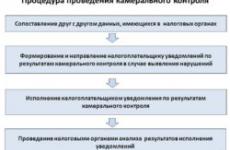Penalty for late payment of car tax. How to pay transport tax to the budget
KBK - transport tax 2017 for organizations still need to pay with its use. This code has not changed compared to the previous period. However, when paying a tax, citizens and enterprises should indicate different BCC. You will learn more about them from our article.
Calculation and calculation of transport tax
The duty to pay transport tax lies on all owners of vehicles - both ordinary citizens and organizations. The basis for calculating the tax on land vehicles is the engine power, measured in horsepower.
The tax is recognized as regional and is paid to the budget at the place of registration of the car. Only organizations are obliged to calculate advance payments (and then only if the law of the region adopts such a tax payment procedure), other persons do not have such a need.
KBK on transport tax in 2017 for individuals
Vehicle owners are payers transport tax.In contrast to legal entities that independently calculate the tax, citizens receive a notice-calculation from the Federal Tax Service, which is formed in accordance with the data of the bodies that register vehicles.
If there is no tax notice from the Inspectorate of the Federal Tax Service, then the physical person should independently notify the tax authority that he has transport. Subject to tax.
Read about the consequences of timely and untimely reporting about this. .
According to paragraph 1 of Art. 363 of the Tax Code of the Russian Federation, citizens need to make timely payment for the cars they have before December 1 of the next year inclusive.
By transportation tax KBKat 2017 year for individuals will be as follows: 182 1 06 04012 02 1000 110.
For payment by individuals transportation tax KBK in 2017 year has not changed.
CSC transport tax - 2017 for organizations
For any legal entities, despite the tax system, recognized the obligation to pay transport tax on all registered vehicles, which is used in the business activities of the subject. Their calculation of the amount of tax payments, in accordance with paragraph 1 of Art. 362 of the Tax Code of the Russian Federation, is made independently, if such payments are established in the region. Payment (clause 3 of article 363.1 of the Tax Code of the Russian Federation) is transferred quarterly (if there are advances) or immediately for the whole year after it ends. Reporting is submitted to the fiscal authorities before February 1 of the year following the reporting year, inclusive.
For legal entities KBK by transport tax in 2017 the following: 182 1 06 04011 02 1000 110.
As always, accountants are concerned about the question: have there been any changes in CSC Transport Tax - 2017 for legal entities or not? We can reassure readers: CSC Transport Tax - 2017 for Organizations remained unchanged.
KBK transport tax penalties
In case of late payment of accrued tax, you will have to pay to the budget and corresponding penalties for each day of delay. KBK transport tax penaltiesin 2017:
- for companies - 182 1 06 04011 02 2100 110
- for individuals - 182 1 06 04012 02 2100 110.
To pay penalties for transportation tax KBK in 2017 year has not changed either for organizations or for individuals.
CSC (budget classification codes) are codes intended for making payments to the tax authorities. From this article you can find out what are the BCC for penalties for transport tax.
As you know, if the taxpayer overdue the payment of tax, there will be a shortfall, the amount of which will be charged penalties. To transfer fines to the budget, you need to use special codes. What exactly, consider below. In the meantime, in more detail we will understand what constitutes the CSC.
CSC Decryption
All classification codes include twenty digits. With their help is the decoding of the code. Each code consists of four sections:
- Administrative;
- Profitable;
- Software;
- Classifying.
Consider each of them in more detail.
The administrative section is the first three digits of the code. They determine the sign of payment, that is, where the money will be sent (to various funds, to the tax authorities and others).
The revenue section includes ten numbers, and in turn is divided into four groups:
- The first figure in this section indicates the type of income (tax payments - figure 1).
- The next two numbers indicate the purpose of the payment to be made.
- The next five numbers will determine whether the revenues correspond to the budget code (the first two indicate the article, and the last three indicate the sub-article).
- The last two numbers of the section indicate the level of the budget to which the money is transferred.
The program section consists of four numbers; it determines the type of payment (payment of taxes, penalties or fines).
The last classifying section includes three numbers. It contains information that indicates the classification of the payment according to its profitability.
Assign Codes
Classification codes are needed for the following purposes:
- Budgeting at various levels;
- The execution of these budgets;
- Reporting;
- Conduct comparability of various indicators.
With the help of BCF can be divided:
- Profit;
- Expenses;
- Perfect operations;
- Sources for which the budget deficit is covered.
CSC for individuals
Citizens on whom any vehicle is registered (except for the exceptions listed in the Tax Legislation) are recognized as tax payers of transport. Independently, as a legal person does, they do not need to calculate the tax. For them, this is done by the tax inspectorate, it sends them a notice-calculation with the amount of tax payable.
The main CSC for the tax on transport for citizens are:
- 182 1 06 04012 02 1000 110 - used when transferring the amount of tax to the budget of any level;
- 182 1 06 04012 02 2100 110 - interest on the transport tax of individuals;
- 182 1 06 04012 02 3000 110 - transfer of a fine received for not paying tax on transport.
Codes for companies
 All companies that own transport, regardless of the taxation system they have chosen, are obliged to pay tax on this transport. Calculate the amount of tax payable, they must independently. Payment can be made quarterly, and maybe in one payment at the end of the tax period. However, reports must be submitted only once a year (until February 1 of the year that follows the reporting year).
All companies that own transport, regardless of the taxation system they have chosen, are obliged to pay tax on this transport. Calculate the amount of tax payable, they must independently. Payment can be made quarterly, and maybe in one payment at the end of the tax period. However, reports must be submitted only once a year (until February 1 of the year that follows the reporting year).
The main codes are:
- 182 1 06 04011 02 1000 110 - used to transfer taxes;
- 182 1 06 04011 02 2100 110 - for transferring fines to legal entities;
- 182 1 06 04011 02 3000 110 - used to transfer fines.
An important feature of classification codes for organizations is that the accountants of this organization who are involved in the preparation of payment orders are required to look for the necessary codes on the Internet themselves.
Codes change almost every year, in connection with this accountant must be very careful.
Read more about the BCC on the transport tax for organizations can be found in.
All codes for transport tax
All KBK for transport tax for the 2016-2017 year are presented in the following table:
| Assignment code | Code |
| Tax on transport levied on organizations (arrears, recalculations, arrears) | 182 1 06 04011 02 1000 110 |
| KBK penalties for transport tax (from legal entities) | 182 1 06 04011 02 2100 110 |
| The amount of interest on transport tax levied on companies | 182 1 06 04011 02 2200 110 |
| Fines and other administrative penalties levied on legal entities for late or non-payment of transport tax | 182 1 06 04011 02 3000 110 |
| Other income from transport tax organizations | 182 1 06 04011 02 4000 110 |
| Payment by the company of interest on taxes accrued on the amount of overpaid payments | 182 1 06 04011 02 5000 110 |
| The amount of tax on transport levied on individuals | 182 1 06 04012 02 1000 110 |
| Taxes on transport tax accrued to citizens for late or non-payment | 182 1 06 04012 02 2100 110 |
| Tax interest accrued to individuals | 182 1 06 04012 02 2200 110 |
| Amounts of fines and other monetary sanctions levied on individuals for violations | 182 1 06 04012 02 3000 110 |
| Other income from citizens for transport tax | 182 1 06 04012 02 4000 110 |
| Individuals paid interest accrued for overpaid payments | 182 1 06 04012 02 5000 110 |
Accountant's actions in making a mistake
Errors made when writing a budget code are divided into two groups:
- Leading to payment of the payment in the budget of any level;
- Non-payable amounts to the budget.
If a second mistake was made, and it was not corrected, it would entail the arising of an arrears. In this regard, the tax inspectorate will impose sanctions on the tax payer, such as fines and penalties.
Correction of this error is possible only by transferring the required amount through a corrected payment order.
If you make the first mistake (if money gets into the budget), you will also have to incur liability in the form of fines and penalties. However, the tax law informs that the payer is not obliged to indicate the purpose of the payment, he can only do this if he wishes. Therefore, you need to make another payment, and if the tax inspectorate will impose fines, you can go to court.






